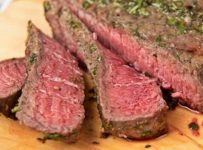By Nate Miyake Men’s Fitness
Paying attention to calories and macronutrients (protein, carbs, fat) is the bottom line when it comes to slashing fat, building lean muscle, and achieving your ideal physique. This transformative diet plan is set up to create a caloric deficit (you’ll burn more calories than you’ll consume) for optimum fat loss, while maintaining sufficient protein to build new muscle and just enough carbs to fuel the energy and recovery demands of high-intensity workouts.
POWER FOODS
Nutrient-dense, high-satiety foods make it surprisingly easy to stay in the calorie deficit necessary for fat loss, while still providing the body with the essential nutrients necessary for optimum energy, recovery, and results.
This diet emphasizes animal proteins, non-starchy vegetables, whole fruit, whole-food fats, and a select few starches (yams, sweet potatoes, potatoes). Refined and processed foods will only slow down your progress, with the exception of the occasional “cheat night.”
THE GAME PLAN
Common approaches to dieting for fat loss, such as eating six meals per day or abstaining from food entirely at night, can yield great results, however these plans are rarely practical for the average guy with a job, family, and other commitments. This diet plan will provide an equally effective, more practical alternative.
Numerous scientific studies have shown that if you stick to high-quality foods and are mindful of your total daily calories, meal frequency has no bearing on changes in body composition and metabolic rate. Thus, how often you eat is up to you; just be sure to take your schedule into account and be realistic with yourself. The key here is to make this plan as practical and sustainable as possible.
FAST RESULTS
Human beings evolved on a fasting and feeding cycle. We spent the majority of our existence fasting or eating lighter during the day while actively tracking, hunting, and gathering our food. Then, in the evenings, we relaxed and feasted on the majority, if not all, of our daily food intake. This primal template, it turns out, is perfectly matched to the natural instincts and social patterns of the average modern man.
– Fasting during the morning and eating a lower-carb lunch controls insulin and blood sugar levels and causes fat-burning hormones to surge for a large portion of the day.
– Saving all of your starchy carbs for dinner improves nutrient partitioning (diverting calories to muscle instead of fat storage), and maximizes muscle-building hormones at night.
Think of it as two distinct nutritional periods: During the day you are in fat-burning mode, and then at night you flip a switch and turn on muscle building, nutrient storage, and recovery.
THE MEALS
BREAKFAST
Skip it. Drink black coffee or plain tea.
LUNCH
Combine an 8 oz serving of protein with one serving of whole-food fats.
SAMPLE LUNCHES
8 oz flank steak
3 whole eggs
8 oz chicken breast
½ cup almonds
8 oz salmon
½ avocado
DINNER
Combine an 8 oz serving of protein with 3–4 servings of starchy carbs and an unlimited amount of non-starchy vegetables.
SAMPLE DINNERS
8 oz sea salt and pepper buffalo steak
24 oz baked potato
Mixed green salad
8 oz garlic chicken and vegetable stir-fry
3–4 cups white rice
8 oz baked salmon
3 cups mashed sweet potato
Green beans and shiitake mushrooms
MAXIMUM MUSCLE
After you work out, your body goes into a catabolic state where muscle tissue is broken down. This is the crucial nutritional “window” you’ve probably heard about, when every calorie counts toward rebuilding your muscles to be bigger and stronger than before. Neglect it, however, and the effect is reversed. To tip biology in your favor and kick-start the muscle-building process, eat one serving of whole fruit (banana, orange, grapefruit, berries) immediately post-workout, regardless of the time of day you train. Fruit is a fast-digesting, anti-catabolic carb source that provides your body with immediate recovery fuel.
CHEAT MEALS
On this plan, you can allow yourself a no-holds-barred cheat meal once a week. The timing is up to you, but weekends might make the most sense for social reasons. On a day that you plan to eat your cheat meal, have your usual low-carb lunch, and then set yourself loose at dinner. For even further physiological benefits, emphasize carbohydrates in your cheat meals by doubling your daily carb intake. Carbs have the greatest impact on a hormone called leptin, which down-regulates during prolonged calorie deficits. This in turn causes testosterone and thyroid levels to drop and will also help make your plan more sustainable over the long term.
Source: http://www.mensfitness.com/nutrition…e-changer-diet






